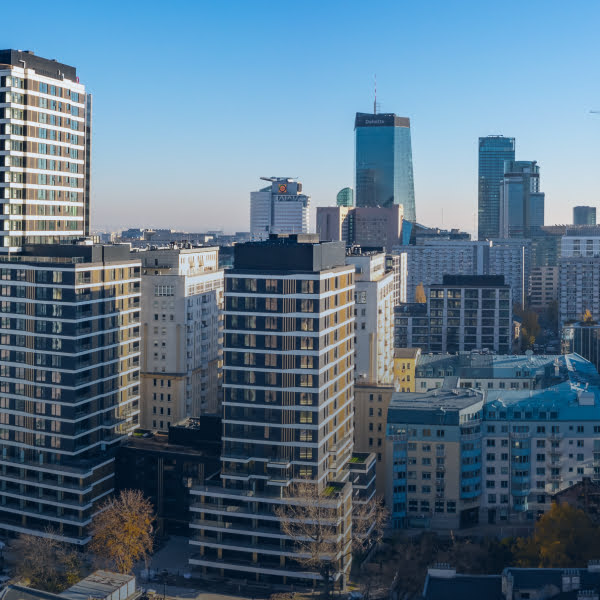Prioritising investments in energy-efficient and sustainable construction
Unibep Group considers both its direct and indirect impact on its environment. We are an employer, a taxpayer, a sponsor, a benefactor, a partner for our contractors, and we make a number of investments that have a positive impact on infrastructure. As part of our residential construction projects, we build and make available additional infrastructure that is widely used by our customers. This includes pavements, access roads, playgrounds, sports fields, garden squares, recreation areas or insect houses. We believe that our construction projects and the technologies we offer are the future of the industry. We want to build ecological, passive and zero-energy buildings that meet demanding standards in terms of energy consumption and offer them to our customers. We have also created an energy and industrial construction segment within Unibep SA to offer our customers energy modernisation services on an industrial scale, using the practical experience of all businesses operating as part of the group.
We identify our environmental impact
By identifying and monitoring our activities, we can learn about their actual impact on the environment in terms of greenhouse gas emissions into the atmosphere, energy intensity of the production process, water consumption or waste production. We have developed our own methodology for identifying and assessing all environmental impacts that may arise during the various stages of the project, including construction, pre-commissioning and commissioning.
Unibep Group continuously monitors key environmental aspects in the context of our operations, including water consumption, sewage disposal, electricity and heat consumption, fuel consumption, refrigerant losses, consumption of key raw materials and materials and quantities of waste generated and processed. Monitoring is carried out in accordance with applicable procedures, starting from the design stage, moving on to project preparation and implementation, and ending with project closure. We carry out quantitative and qualitative monitoring (environmental reviews, internal audits) of each activity. We implement measures to reduce our environmental impact as identified.
We reduce our impact on the environment
We are aware that every action of our group affects the environment, and so we implement solutions and technologies to monitor and reduce our environmental impact. The actions that our companies plan to implement as part of their environmental protection activities take into account national environmental conservation regulations and local laws, including provisions of environmental permits issued in respect of individual projects. Principles for dealing with animate and inanimate nature are defined in the document titled "Environmental Action Plan". They are the product of an assessment of environmental aspects relevant to a given construction site and require all the contractors working on the project to carry out their works in accordance with the provisions of the plan, implementing measures to minimise their environmental impact. Depending on the specifics of the project, the plan can be modified by adding or removing relevant environmental measures. Its final form is the result of cooperation between the environmental specialist and the site management, which enables us to determine the types of prospective environmental measures that can be implemented.
Importantly, our actions go beyond the requirements of the applicable regulations. We have implemented an environmental management system based on the ISO 14001 standard. We are taking a number of measures to reduce our environmental footprint – we strive to use sustainable raw materials, we are taking steps to use energy and fuel efficiently, we are gradually introducing electric vehicles into our fleet and we have been able to gradually improve our waste segregation while minimising its generation.
We involve employees in our environmental campaigns, as we believe that everyday habits and behaviours make a difference. Having our employees in mind, we run information campaigns on ecology, such as Ecological Gestures or Eco-Me. We encourage staff to sort waste, including hazardous e-waste and batteries, and give up single-use plastic packaging. We tell them how they can save water and energy and describe the importance of the plants that live around us. We show how to spend free time in an ecological way and encourage them to choose a bike instead of a car. We motivate and inspire them to develop environmentally friendly habits, at work and beyond.
We measure our impact on the environment. We want to know the overall carbon footprint of our operations, i.e. the amount of greenhouse gases we emit into the atmosphere. We use this information to take measures aimed at reducing and compensating for our impact in this regard. We invest in cutting-edge technologies to reduce our organisation's energy consumption (e.g. electric cars, lighting upgrades) and increase the share of RES in our energy mix. These are just a few of the many initiatives we take to compensate for the negative impact our industry has on the environment.
Unibep Group uses water for business-related activities and for domestic purposes. Where possible, we aim to connect our sites to sewerage networks. We do not source water from surface water, including sea water. The waste water we generate is domestic sewage discharged into the sewerage system or into septic tanks. We do not discharge waste water directly into the environment.
The consumption of water resources is highly dependent on the type of project in question and its stage, but we always try to identify and implement measures aimed at reducing consumption. We measure the effects of our water management measures and policies through continuous monitoring of the amount of water used and waste water produced, as well as through waste-water testing.
We estimate the environmental footprint of each project we implement as one of its identified environmental aspects. The group also recognises the business opportunities afforded by climate change, and is engaged in the construction of modular timber homes, and more recently has expanded into the energy and industrial segment. Unibep Group intends to comprehensively participate in the transformation towards a zero- and low-carbon economy on a national level.
Calculating emission levels is a necessary step towards taking action to reduce and decarbonise our organisation and its impact on the climate. We are constantly developing the monitoring of greenhouse gas emissions related to our activities. In 2021, we improved the data collection and aggregation process and identified all direct (Scope 1) and indirect (Scope 2) emissions, in line with the GHG Protocol methodology. We measure emissions to air generated by our Bituminous Mass Plants. We also measure other air emission levels, which are then reported to the National Centre for Emissions Management, and set realistic targets for reducing the greenhouse gases we emit.
The amount of waste generated by our companies depends largely on the number of projects we pursue. Waste is mainly generated during the construction process, e.g. during demolition and renovation work. We prepare a "Waste Management Plan" for each project, which describes aspects such as practices used for handling hazardous and municipal waste, introduces the requirement to remove waste produced as a result of works carried out by the contractor from the site on an ongoing basis, prohibits storing waste outside the construction site and requires the contractor to ensure the shortest possible distance between the location where waste is generated and waste sorting and recycling plants.
We aim to minimise the amount of waste generated at each stage of each project and reduce the amount of waste dumped at landfills. We continuously monitor the amount of waste generated and waste segregation levels at all permanent locations and construction sites. Hazardous waste is subject to special monitoring. Environmental services and internal auditors carry out periodic environmental reviews. We also have external audits and inspections performed in our companies. We successively expand guidelines for minimum waste separation levels applicable at Unihouse's construction sites and in its factory.
As part of the implementation of Unibep Group's environmental strategy, we have defined methods and principles applicable in four key areas: soil and water environment, air, biodiversity, and climate. Principles introduced in these four areas comprise the Environmental Protection Standards, the observance of which ensures that construction work and ancillary processes are carried out in an environmentally sound manner. The Environmental Protection Standards apply to all employees of the Unibep Group and contractors involved in the execution of projects, as well as other interested parties. Our organisation cares about sustainable development and environmental protection, and engages in numerous pro-environmental initiatives and activities, the most important of which include forest cleaning, tree planting and bird feeding campaigns; educational events for prospective residents of the buildings we construct; the Cleaner Production Academy campaign, which involves building and putting up insect hotels, feeders, nesting boxes, hedgehog houses, etc. An environmental first aid kit is set up on each construction site to help deal with potential chemical spills. Contractors are required to report all environmental incidents and take corrective and preventive action.

















